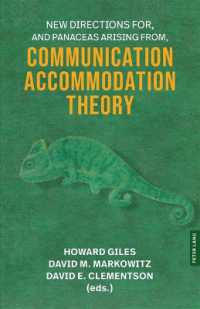- ホーム
- > 洋書
- > 英文書
- > Religion / Ethics
Full Description
Three churches have recently produced liturgies for 'extended communion'. This is the distribution of previously consecrated elements at a public service by lay people or a deacon in the absence of a priest. This development began in the Roman Catholic Church with the Vatican 'Directory on Sunday Worship in the absence of a priest' in 1988. The Methodist Church produced a service of Extended Communion in 1999, and the Church of England authorized 'Public Worship with Communion by Extension' in 2001. In this book Phillip Tovey examines these churches to discover the reasons for the production of these services and their theological rationale. An in-depth examination of case studies draws conclusions highly relevant to the wider church.
Contents
Contents: Introduction: the nature and scope of this book; Part I Developments in the Churches: The Roman Catholic church; The Methodist church; The Church of England and the Anglican Communion; Part I: conclusions. Part II A Case Study and Theological Implications: Case studies from the rural parishes; Case studies from the urban parishes; Repercussions for ministry; Questions of liturgical practice; Implications for ecclesiology; Part II: conclusions. Part III General Conclusions: General conclusions; Bibliography; Index.








